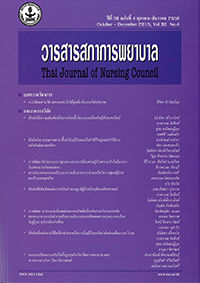การพัฒนาโปรแกรมการดูแลตามระยะเปลี่ยนผ่านผู้ป่วยภาวะหัวใจล้มเหลว โรงพยาบาลกำแพงเพชร
คำสำคัญ:
โปรแกรมการดูแลตามระยะเปลี่ยนผ่าน, ภาวะหัวใจล้มเหลว, transitional care programme, programme development, heart failure patients, action researchบทคัดย่อ
บทคัดย่อ: วัตถุประสงค์: เพื่อพัฒนาและประเมินการใช้โปรแกรมการดูแลตามระยะเปลี่ยนผ่าน ผู้ป่วยภาวะหัวใจล้มเหลว ในแผนกอายุรกรรม โรงพยาบาลกำแพงเพชร
การออกแบบวิจัย:การวิจัยเชิงปฏิบัติการ
วิธีดำเนินการวิจัย:ดำเนินการเป็น 3 ระยะ ระยะที่ 1 วิเคราะห์สถานการณ์ด้วยการทบทวน เวชระเบียนผู้ป่วย 75 ราย สนทนากลุ่มพยาบาลวิชาชีพ 20 คน นำข้อมูลมาพัฒนาโปรแกรม วิเคราะห์ ข้อมูลด้วยการวิเคราะห์เนื้อหา และสถิติบรรยาย ระยะที่ 2 พัฒนาโปรแกรมการดูแลตามระยะเปลี่ยนผ่าน ผู้ป่วยภาวะหัวใจล้มเหลวจากข้อมูลข้างต้นร่วมกับทบทวนวรรณกรรมและสังเคราะห์หลักฐาน เชิงประจักษ์ ระยะที่ 3 ประเมินการใช้โปรแกรมการดูแลตามระยะเปลี่ยนผ่านผู้ป่วยภาวะหัวใจล้มเหลว โดยเปรียบเทียบการกลับเข้ารักษาซ้ำจำนวนวันนอน ค่ารักษาพยาบาลระหว่างกลุ่มควบคุมและ กลุ่มใช้โปรแกรมด้วย chi-square test และ rank sum test เปรียบเทียบภายในกลุ่มใช้โปรแกรมด้วย mcnemar’s chi-square test และ sign rank test เปรียบเทียบคุณภาพชีวิต ระยะทางที่สามารถเดิน บนทางราบในเวลา 6 นาที และระดับความรุนแรง ภายในกลุ่มใช้โปรแกรมด้วย McNemar’s test, t-test, Rank Sum test และSign Rank test
ผลการวิจัย:จากการวิเคราะห์สถานการณ์พบผู้ป่วยภาวะหัวใจล้มเหลวกลับเข้ารักษาซ้ำร้อยละ 58.5 จากการสนทนากลุ่ม ประเด็นปัญหาคือขาดการประเมินปัญหาเพื่อนำมาวางแผน ผู้ป่วย ไม่ได้รับความรู้อย่างครบถ้วนและครอบคลุม และเสนอแนวทางพัฒนาคือ ควรให้ความรู้เชิงรุก ในหน่วยงานที่เกี่ยวข้อง และจัดโปรแกรมการดูแลที่เป็นรูปแบบเดียวกันในทุกหน่วยงาน โดยโปรแกรม การดูแลตามระยะเปลี่ยนผ่านผู้ป่วยภาวะหัวใจล้มเหลว ประกอบด้วย การดูแลผู้ป่วยในระยะ เฉียบพลัน ก่อนจำหน่าย และต่อเนื่องหลังจำหน่าย ผลลัพธ์หลังจากใช้โปรแกรมพบว่า การกลับเข้า รักษาซ้ำวันนอนเฉลี่ย และค่ารักษาพยาบาล ของกลุ่มที่ใช้โปรแกรมน้อยกว่ากลุ่มที่ไม่ใช้โปรแกรม อย่างมีนัยสำคัญทางสถิติที่ระดับ .05 นอกจากนี้คุณภาพชีวิต ระดับความรุนแรง (NYHA class) และระยะทางที่สามารถเดินบนทางราบในเวลา 6 นาที ที่ 6 เดือนหลังจำหน่าย ดีกว่าตอนจำหน่าย อย่าง มีนัยสำคัญทางสถิติที่ระดับ .05
ข้อเสนอแนะ:โปรแกรมการดูแลตามระยะเปลี่ยนผ่านผู้ป่วยภาวะหัวใจล้มเหลวช่วยเพิ่ม ประสิทธิภาพการดูแลผู้ป่วยควรสนับสนุนให้ดำเนินการอย่างต่อเนื่อง
Abstract: Objective: To develop, and evaluate the efficacy of, a transitional care programme for heart failure patients at Kamphaengphet Hospital’s internal medicine department.
Design: Action research.
Implementation: The study was conducted in three stages. Stage one involved preliminary analysis of the general situation, a review of the medical records of 75 patients, and interviews with 20 registered nurses. The data obtained were analysed using content analysis and descriptive statistics, for the purpose of developing a transitional care programme. Stage two was devoted to the development of the transitional care programme for the heart failure patients selected in stage one for the study. In this stage, related literature was also reviewed, and empirical evidence synthesised. Stage three was for efficacy evaluation of the programme, by comparing the number of returns for treatment, the number of days of hospitalisation, and the medical expenses between the control and the experimental groups. The inter-group analysis was performed using chi-square test and rank sum test. Intra-group comparisons were based on three variables, namely, the quality of life, the distance each subject was able to cover on foot for 6 minutes on a flat surface, and severity of the disease. The comparative results were analysed using Mcnemar’s test, t-test, rank sum test, and sign rank test.
Results: The analysis of the patients’ situation showed that re-hospitalisation for heart failure treatment was required for 58.5 percent of the subjects. The group interviews revealed an absence of planning-oriented patient evaluation and a lack of thorough and comprehensive treatment-related information for the patients. To address these shortcomings, it is recommended that knowledge of proactive strategies be provided for related organisations, all of which should be encouraged to adopt the same type of transitional care programme for heart failure patients.
This transitional programme, designed to deal with acute attacks, pre-discharge conditions, and post-discharge follow-ups, was found to significantly reduce the experimental group’s average rate of re-hospitalisation, number of days of hospitalisation, and medical expenditures by a value of .05, compared with the control group. In addition, significant improvement, by an average value of .05, was observed in the areas of quality of living, severity (NYHA class), and distance covered in six-minute walking on a flat surface.
Recommendations: This transitional care programme was proved effective in increasing the efficacy of caring for heart failure patients. It is recommended, therefore, that the programme be implemented on a regular basis.
Downloads
เอกสารอ้างอิง
McMurrayJV, Adamopoulos S, Anker SD, Auricchio A, Böhm M, Dickstein K, et al. ESC Guidelines for the diagnosis and treatment of acute and chronic heart failure. Eur J Heart 2012; 33:1787–1847.
Webel AR, Frazier SK, Moser DK, Lennie TA. Daily variability in dyspnea, edema and body weight in heart failure patients. Eur J CardiovascNurs 2006; 6:60-5.
Sangwatanaroj S. Heart failure. In: Sridama V. editor. Textbook of Internal Medicine 4. 2nded. Bangkok: Faculty of Medicine, Chulalongkorn University, Thailand; 2007. (in Thai).
Brand C, Sundararajan V, Jones C, Hutchinson A, Campbell D. Readmission patterns in patients with chronic obstructive pulmonary disease, chronic heart failure and diabetes mellitus: An administrative dataset analysis. Int J Med 2005; 35(5):296-9.
Heart Failure Society of America. Executive summary: HFSA 2010 comprehensive heart failure practice guideline [Electronic version]. J Card Fail 2010; 16(6):475-539.
Thepthong T. Effectiveness of implementing best practices of care for heart failure patients during transition from hospital to community, Uttaradit hospital. (M.N.S thesis) Chiang Mai: Chiang Mai University; 2012. (in Thai).
Angkhanit M. Effectiveness of transitional care for persons with heart failure.(M.N.S thesis) Chiang Mai: Chiang Mai University; 2005. (in Thai).
Arnold JMO, Howlett JG, Ducharme A, Ezekowitz JA, Gardner M J, Giannetti N, et al. Canadian cardiovascular society consensus conference guidelines on heart failure-2008 update: Best practices for the transition of care of heart failure patients, and the recognition, investigation and treatment of cardiomyopathies [Electronic version]. Can J Cardiol 2008; 24(1):21-40.
Medical record and Statistic section. Annual Statistics. Kamphaeng Phet hospital; 2011-2013. (in Thai).
Schumacher KL, Meleis AI. Transitions: a central concept in nursing. Image J NursSch 1994 Summer; 26(2):119-27.
Naylor MD, Keating SA. Transitional care: moving patients from one care setting to another. Am J Nurs 2008 September; 108 Suppl 9:58–63.
Titler MG, Kleiber C, Steelman VJ, Rakel BA, Budreau G, Everett LQ, et al. The Iowa model of evidence-based practice to promote quality care. Crit Care NursClin North Am2001; 13(4):497-507.
Chunnawong K. Outcome of home-based walking program on exercise capacity and quality of life in chronic heart failure patients. (M.N.S thesis) Chiang Mai: Chiang Mai University.; 2004. (in Thai).
Ruangwilai N, Nantachaipan P, Chaiard J. A Systematic review on postdischarge care for patients with heart failure. Nursing Journal 2013; 40(3):50-61. (in Thai).
Yindesuk T, Wachirawat W, Keeratiyutawong P. Clinical pathway for promoting self-management of patients with congestive heart failure at Sappa¬sittiprasong hospital. Thai Journal of Nursing Council 2011; 26(4):70-81. (in Thai).
Brett D, Fleming N, Herrin J, Stafford PM, Ballard J, Fullerton, et al. Effectiveness and cost of a transitional care program for heart failure.Arch Intern Med 2011; 171(14):1238-43.
Rerkluenrit J, Panpakdee O, Malathum P, Sandelowski M, Tanomsup S. Self-care among thai people with heart failure. Thai Journal of Nursing Research 2009; 13: 43-54.








